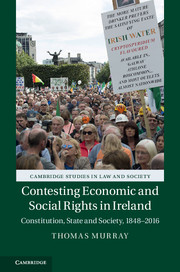Book contents
- Frontmatter
- Dedication
- Contents
- Acknowledgments
- Introduction: The Politics of Economic and Social Rights
- 1 Constitution ‘from Below’ in Ireland: 1848–1922
- 2 ‘Not Alone Personal Liberty but Economic Freedom’: Socio-economic Rights in the Making of the 1922 Irish Free State Constitution
- 3 ‘Highly Dangerous’? Socio-economic Rights in the Making of the 1937 Irish Constitution
- 4 Contesting the Irish Constitution and the World-System: 1945–2008
- 5 The Polarities of Justice and Legal Business
- 6 Contesting Property Rights
- 7 Contesting Trade Union Rights
- 8 Contesting Family, Education, andWelfare Rights
- 9 Reproducing the Value-Consensus State
- 10 Constitution ‘from Below’ in Ireland: 1945–2008
- Conclusion: Contesting Economic and Social Rights Today
- Bibliography
- Index
3 - ‘Highly Dangerous’? Socio-economic Rights in the Making of the 1937 Irish Constitution
Published online by Cambridge University Press: 05 August 2016
- Frontmatter
- Dedication
- Contents
- Acknowledgments
- Introduction: The Politics of Economic and Social Rights
- 1 Constitution ‘from Below’ in Ireland: 1848–1922
- 2 ‘Not Alone Personal Liberty but Economic Freedom’: Socio-economic Rights in the Making of the 1922 Irish Free State Constitution
- 3 ‘Highly Dangerous’? Socio-economic Rights in the Making of the 1937 Irish Constitution
- 4 Contesting the Irish Constitution and the World-System: 1945–2008
- 5 The Polarities of Justice and Legal Business
- 6 Contesting Property Rights
- 7 Contesting Trade Union Rights
- 8 Contesting Family, Education, andWelfare Rights
- 9 Reproducing the Value-Consensus State
- 10 Constitution ‘from Below’ in Ireland: 1945–2008
- Conclusion: Contesting Economic and Social Rights Today
- Bibliography
- Index
Summary
Article IX. The Government will take measures…to secure that the issue of credit, which at the present day ‘supplies as it were the life blood of the entire economic body’ should not fall directly or indirectly under the control of foreign or international financiers, nor be abused in the interests of private individuals or syndicates to the injury of the common good.
– Edward Cahill to Éamon de Valera‘Community effort’. This is Karl Marx terminology.
– John Charles McQuaid to de ValeraBunreacht na hÉireann (1937) was created at a time of international upheaval and pronounced ideological contestation. The Great Depression of the 1930s had occasioned a pronounced transformation of the historical capitalist world-system, notably ending the hegemonic roles of both the British Empire and the City of London. The decade was characterised by the gradual dismantling of multilateral trade in favour of economic self-sufficiency, by the collapse of the League of Nations in favour of autarkist empires and, above all, by mass unemployment. Classic economic liberalism was dead, and would remain so for half a century. Among liberal democracies, various forms of state or ‘social’ control of capital emerged instead, typified by France's Matignon Agreements or by the New Deal in the US. Social democracy formed an often unsympathetic alternative to the social revolution and radical democracy attempted in Republican Spain and Anarchist Barcelona.
There were more authoritarian alternatives. In Italy and Germany, fascist parties introduced a highly coercive system of corporate societal management, achieving full employment while preserving the classic freedoms of capital (free investment, free accumulation, free exchange of contract, and free selection of markets). Similarly, authoritarian nationalists in Poland, Austria, Hungary, and Portugal selectively invoked Catholic corporatism to justify curtailing organised labour. Concomitantly, in Russia, Joseph Stalin's Communist Party introduced a series of Five-Year Plans, using a centrally planned economy to achieve rapid industrialisation and increased military capacity.
In contrast to wider European experiences, the Irish Free State's social conflicts were not of a scale or nature to threaten the state's continued existence as a representative democracy. In both parliament and civil society, the national anti-systemic movement remained in the ascendant, its party leadership largely committed to renegotiating sovereignty with Westminster while preserving existing institutions of government and administration in Dublin.
- Type
- Chapter
- Information
- Contesting Economic and Social Rights in IrelandConstitution, State and Society, 1848–2016, pp. 112 - 159Publisher: Cambridge University PressPrint publication year: 2016



